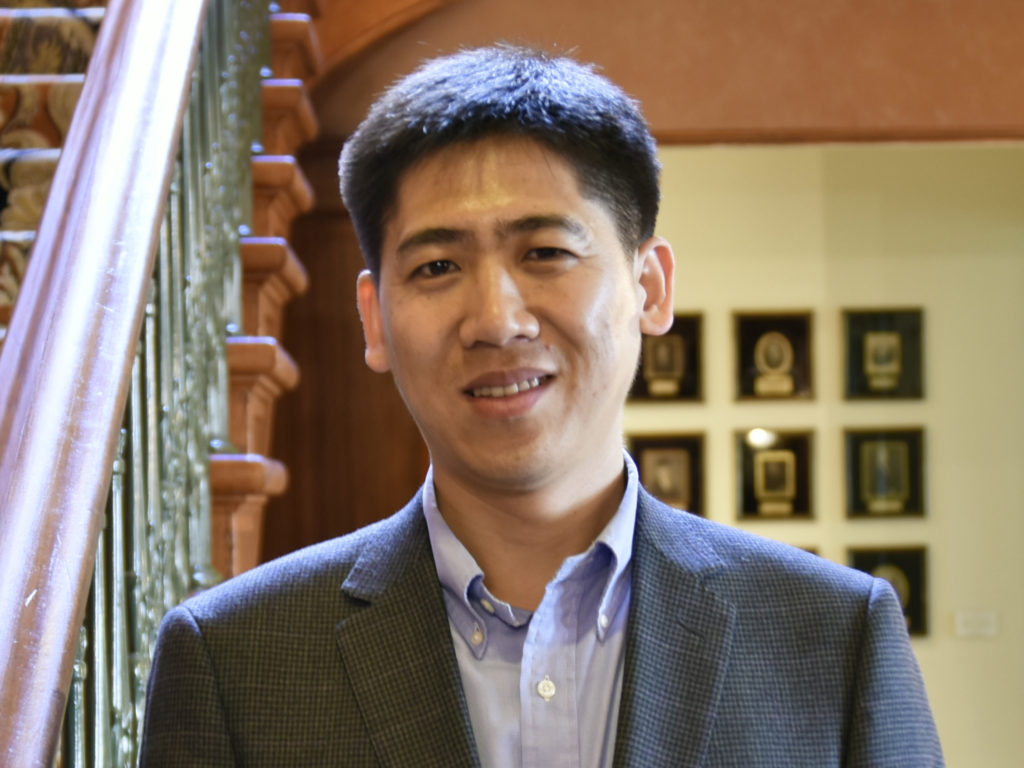By Doug Hulette

Zhiyong (Jason) Ren envisions a world that purifies its wastewater and produces energy with symbiotic systems: the output of one constitutes the input of the other. That’s no modest ambition at a time when future energy sources are a global concern, and some predict the next world war may be fought over the availability of water.
Ren will join Princeton and the Andlinger Center for Energy and the Environment as a professor of civil and environmental engineering in July. He brings a research portfolio that emphasizes environmental sustainability with integrated recovery of energy, water, and other resources. The ultimate goal for Ren is a so-called circular global economy that reuses everything and produces nothing in terms of what we call “waste.”
Currently an associate professor at the University of Colorado Boulder, Ren is the director of the Water Energy Nexus Interdisciplinary Research Theme and leads the Water Resource Recovery Lab. He also is a visiting professor at the National Renewable Energy Lab, a research and development facility in Golden, Colo., operated by the U.S. Department of Energy.
Ren is on a mission to understand and solve global water and energy challenges. “The water and energy systems are intertwined in multiple ways,” he said. “You can’t really transport and treat water without energy. And to generate energy, power plants need water for cooling and other purposes. Plus, renewable energy has been used for water desalination and treatment. There’s a great nexus between the systems.”
“We’re trying to rethink the relationships between water and energy. For example, how wastewater treatment plants operate and how we can reduce energy consumption as well as recover energy and chemicals, like nutrients and minerals, during the treatment process. Recently, we started to use wastewater treatment to capture and convert CO2 into valuable products.”
Indeed, one hallmark of Ren’s research is how financially sensible it is. By creating a stream of marketable products—both in the forms of energy and materials—his work offers a powerful incentive to change outdated practices, which otherwise might persist because of the high price tag of the alternative.
“Wastewater treatment and/or desalination plants are often the largest energy consumers in a city,” he says. “These new technologies have the potential to transform traditionally energy-intensive processes to energy-neutral or even energy-positive by extracting the chemical and thermal energies embedded in wastewater. Furthermore, value-added chemicals, biofuels, and other resources can be produced, leading a path to a circular economy.
“I’m excited by the basic research, but I’m also an engineer, so I really want to see our knowledge being utilized to make a real impact on industry and society. My students and I have co-founded startup companies to scale up and commercialize these technologies.”
The Andlinger Center has identified the nexus between water and energy as a strategic area of growth and has stressed the need for an integrated approach. In April 2017, the center and the Department of Civil and Environmental Engineering co-sponsored a lecture by Ren, “When Microbiology Meets Electrochemistry, Energy and the Environment Find Synergy.” The presentation discussed Ren’s work in microbial electrochemistry and its applications for water and energy.
Ren says he looks forward to the Andlinger Center’s interdisciplinary approach because his work draws on several disciplines, including materials science, microbiology, electrochemistry, and engineering. “I really look forward to working with the Andlinger Center faculty, staff and students, and also those in my home department and the whole Princeton community, because I see it as a great opportunity for interdisciplinary research,” he says.
Yueh-Lin (Lynn) Loo, the director of the Andlinger Center, the Theodora D. ’78 and William H. Walton III ’74 Professor in Engineering, and professor of chemical and biological engineering, said she expects Ren’s work to build on the Andlinger Center’s strengths in its own fields of energy technologies and energy systems analysis.
Ren’s research also extends into core areas of other Princeton departments, centers and schools, including chemical and biological engineering (molecular water), ecology and evolutionary biology (water-organic interactions), geosciences and the Princeton Environmental Institute (water and ocean science), civil and environmental engineering (hydrology and ecohydrology), and the Woodrow Wilson School of Public and International Affairs (water and related environmental policy).
Loo said she saw Ren’s hiring as a critical step in building an interdisciplinary and formidable team of faculty experts, poised to solve the world’s largest environmental and energy challenges.